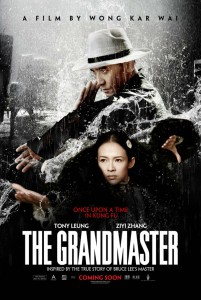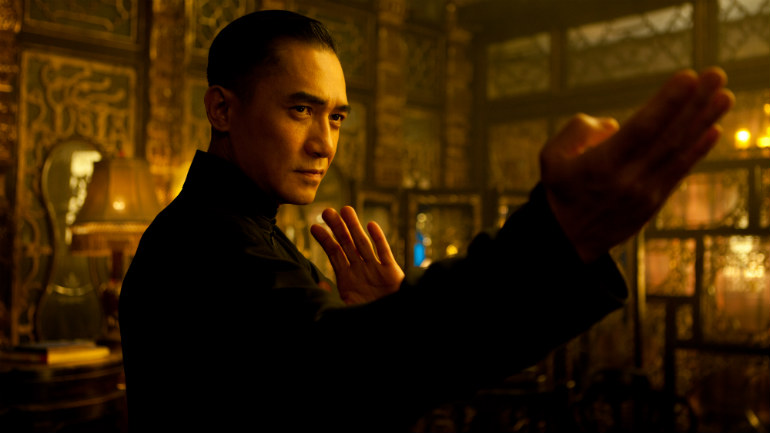
Directed by Kar-Wai Wong
Written by Kar-Wai Wong, Jingzhi Zhou, and Haofeng Xu
China, 2013
In the last several years, Hong Kong cinema has had a fascination with legendary Wing Chun martial artist Ip Man that borders on manic obsession, to the point where it wouldn’t be surprising to find out that Hong Kong cinema spent a week secretly living in Ip Man’s pool house and going through his garbage.
After the Donnie Yen movies, the quasi-prequel and this year’s Ip Man: The Final Fight, Hong Kong auteur Kar-Wai Wong (or Wong Kar-Wai to Westerners) seems to have stepped in and thrown his hat into the increasingly widening Ip Man ring with The Grandmaster, which acts as a somewhat broad biography of Ip Man’s life, told in Kar-Wai’s trademark fragmented narrative style. Tony Leung Chiu-Wai stars as Ip Man, with Zhang Ziyi in the supporting role as Ip Man’s estranged love interest Gong Er.
The film opens on a dramatic fight in a rainy street, with Ip Man handily dispatching a dozen or more opponents in a scene rife with slow-motion and dramatic angles. From there, the action shifts to Ip Man’s upcoming fight with Gong Yutian, a martial arts master from Northern China who has decreed that, upon his retirement as Grandmaster, both the north and south of China should be represented by a single martial artist.
There are several important narrative arcs after this, and the film overall isn’t so much one story as it is several, often only connected by the presence of Ip Man or Ziyi’s Gong Er. What’s refreshing about all of them, however, is how personal and small they are when compared to most other Hong Kong action movie plots, which tend to focus more on grand nationalist myth-making than personal stories. While the Japanese occupation does come into play later in the film, this isn’t a story about China as a whole, but rather a small group of people and their own personal lives and struggles.
Which isn’t to say the film doesn’t do its fair share of myth-making. Characters are often shot in close-ups, in dramatically lit, darkened rooms that seem to emphasize their standing as figures of myth and legend, operating in some nether realm of history and lore. Costume choices like Ip Man’s black-banded white hat or Gong-Er’s massive fur collar seem to be deliberately trying to create an iconography for the characters. It’s this ability to walk the line between personal stories and iconic myth that marks the skilled hand of Kar-Wai Wong at the helm.
Those looking for a fix of hard-hitting action may be somewhat disappointed, however. While the action scenes in The Grandmaster are some of the most beautifully filmed and choreographed of the year, under the skillful eye of fight master Yuen Woo Ping and cinematographer Philippe Le Sourd, they often play out as extensions of the story than exercises in stunt work and catharsis. This is to say that they’re the best kind of fight scenes, the ones that advance the story and tell us something about the characters and their relationships, like the song and dance numbers in a musical. Sure, there’s excitement to be had, especially in scenes like Gong Er’s showdown with rival Ma San or Ip Man training with fellow Southern masters, each of whom could be the star of their own movie, for how well-characterized they are. But this isn’t the kind of movie you go to for excitement or catharsis. Really, it’s more art film than action flick.
Similarly, the fractured narrative may leave some audience members scratching their heads, and even by Kar-Wai’s standards, the narrative is more spread over several miles of open road. Some scenes serve no direct purpose in the narrative, and only vaguely help inform us of the characters. Some, like a scene between Ip Man and a troupe of over-eager students, feels more like a studio exec demanded another scene where Ip Man reduces a room of guys to moaning, quivering throw-rugs, because goodness knows we haven’t seen that in a Hong Kong movie recently.
But even with the narrative problems, The Grandmaster is the most artistically sound of the recent craze of Ip Man movies, one that strives to be about more than just kicking ass or pounding the nationalist drum. Like all of Kar-Wai Wong’s work, this is an intensely beautiful film, with heaps of operatic flair. The especially fractured narrative makes this one of his weaker films, but still absolutely worth seeing.
— Thomas O’Connor



